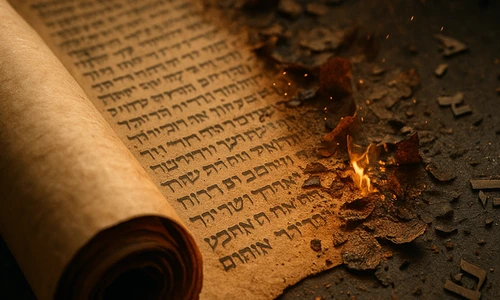Raise Sounds of Joy
David also commanded the chiefs of the Levites to appoint their brothers as the singers who should play loudly on musical instruments, on harps and lyres and cymbals, to raise sounds of joy.
Of the 72 verses in 1 Chronicles 15 and 16, 55 of them—more than 75%—involve organized worship of the Lord.
This is the story of the journey of the Ark of the Covenant to Jerusalem.
Well, it’s really the middle of the story. But the first part is kind of embarrassing, and the last part focuses on Solomon’s temple and not on the Ark specifically. So this is the part of the story everybody talks about.
Remember that the Ark was in Kiriath-Jearim, and David, having finally been recognized as king (1 Chronicles 11:1) following Saul’s suicide during a battle with the Philistines (1 Chronicles 10:1–7), wanted to bring it to Jerusalem, which he had just recently conquered (1 Chronicles 11:4–9).
This is a good thing! They said to themselves, “let us bring again the ark of our God to us, for we did not seek it in the days of Saul” (1 Chronicles 13:3). Seeking the Word of the Lord is undoubtedly a good idea, especially if you’ve ignored it for a while. (There are two other powerful stories in the Old Testament of forgetting and then finding again the Law of God; one with King Josiah in 2 Kings 22, and one with Ezra in Nehemiah 8. Three times in five hundred years doesn’t seem too bad—until you read what happened in between those times. Forgetting the law of God is not a good idea.)
So, blatantly ignoring the law of Moses, they packed it on an oxcart as if it were somebody’s luggage and they set off to deliver it.
This did not go well.
They get to the threshing floor of Chidon, and the oxen stumble, the cart tumbles, and one of the men responsible for the cart, Uzzah, reaches out to stablize it. God immediately strikes him dead, as He promised He would (Numbers 4:15).
David is angry, and probably embarrassed. This was a day of celebration, and “all Israel” is there. They have priests and musicians gathered. This is a triumph for David, God’s anointed king bringing God’s covenant to God’s city. Or at least, it was supposed to be.
So David gets angry, names the place after Uzzah, and leaves the ark with a man named Obed-Edom, who will show up again later.
Weirdly, things kind of continue without interruption, as if this giant procession hadn’t just completely, embarrassingly, failed.
David re-establishes Israel’s alliance with Tyre, marries a few more wives, fathers some children, defeats some more Philistines, and builds himself a house.
Eventually he decides to try again with this ark business. This time, he’s determined to do it right.
So he reminds the people that nobody is allowed to touch the ark—as if they could forget after what happened to Uzzah—and appoints priests to carry it on the poles that Bezalel and Oholiab had made specifically for that purpose (Exodus 25:10–16).
David also gathers 862 Levites1 to assist in the procession, commanding them to cleanse and prepare themselves for the journey. He’s not taking any chances this time.
But it’s not all somber priests. No, this is a celebration, remember, just like the first one was supposed to be. And David loves the Lord, even when he’s making mistakes. So David assigns groups of Levites as musicians, to play the trumpet and harp and lyre and cymbal and to sing, and a conductor to lead them. The obsessive chronicler names all these people and numbers them out by family.
Finally, all is ready, and this huge train of people goes down from Jerusalem to Obed-Edom to get the ark and bring it back.
When they get there, they sacrifice seven bulls and seven rams, put the ark up on their shoulders, and carry it back to Jerusalem, singing and dancing and making music the whole way.
The dancing, by the way, goes right to the top. This is David’s famous “dancing naked” scene, where he gets so caught up in his worship of God that he doesn’t notice he’s lost his robe and goes on celebrating. And his wife Michal, Saul’s daughter, is embarrassed beyond words. (No word on how the other wives or the children feel.)
Anyway, they get back to Jerusalem, sacrifice more animals and grain and wine to the Lord, and David shares his joy with all the people by passing out “a loaf of bread, a portion of meat, and a cake of raisins” to everybody (1 Chronicles 16:2–3).
Now here’s the part that David gets right that so many others across years and centuries have gotten wrong, all the way down to you and me.
This enormous procession—remember, it’s at least a king and 862 priests, but the chronicler says “all Israel” quite a few times, which suggests to me the crowd is uncountable—has just had a “mountaintop experience” like few others have ever known. They are now literally on top of a mountain, because Jerusalem is in fact on top of a mountain. They have the Ark of the Covenant with them. They have a God-anointed king who has conquered their enemies. They’ve been singing and dancing and making music the whole way. And it culminated in a giant feast of bread and meat and raisin cakes.
What happens, in your experience, about a week after a mountaintop experience like this?
Maybe yours is different, but mine is that life returns more-or-less to normal. Sustaining the energy of that moment is just too hard for us. We forget, and we go back to what we were doing before we got up there. You’re not alone; the book of Judges is basically the story of Israel doing this over and over again until God gets sick of it and appoints a king, Saul. Not that that fixes the problem, as we can see in this story today.
But David is having none of that. He refuses to go back to the way things were. He likes his mountaintop, and he’s not leaving. And he’s the king: he can do this sort of thing by fiat. He can simply command people to keep rejoicing!
So he does. He appoints Levites to the offices of worship (1 Chronicles 16:4–7) to make sure the party doesn’t stop. And it’s not like David doesn’t do his part. He composes songs for them to sing! The chronicler gives us a few of them right here in the middle of the story, but if you want to read the rest, they’re close by, just six books forward in your Bible.
Worship, to David, is no joke. It is not to be left to inspiration or to circumstance or to occasion. He sets it up! He appoints leaders! He makes it happen! Worshiping God, the same way they did during the procession, is not optional in David’s Jerusalem. And remember, David’s not done. He wants so badly to build God a giant, awesome temple to hold these parties in. When he gets started, God says No and promises the Messiah instead, but that’s a different story.
Now, as I was writing this, I was thinking (and maybe you are, too), “Wait a minute. David is a vassal king. An under-king. A steward of the nation of Israel. God is the true king; why can David command worship and God cannot?”
You probably know the answer: God does, in fact, command worship! Half the law of Moses is devoted to how to build the tabernacle, which color thread to use, how many pomegranates to put on the cloth, how big the different pieces should be. And then the rules for cleanliness—that’s worship! And the sacrifices and the sacrifices and the sacrifices, so many rules, and all of them about worshiping the Lord.
It doesn’t stop there, either (for that matter, it didn’t start there; God also commanded Abraham to sacrifice, long before Moses). The Old Testament is full of prophets calling people back to God.
And David is limited. He can only command people. Check out these two far-separated verses about the power of God’s command to worship:
The heavens are telling of the glory of God,
And their expanse is declaring the work of His hands.
As he was drawing near—already on the way down the Mount of Olives—the whole multitude of his disciples began to rejoice and praise God with a loud voice for all the mighty works that they had seen, saying, “Blessed is the King who comes in the name of the Lord! Peace in heaven and glory in the highest!” And some of the Pharisees in the crowd said to him, “Teacher, rebuke your disciples.” He answered, “I tell you, if these were silent, the very stones would cry out.”
The heavens and the earth, sky and stone, cry out for the glory of God. David’s little band of cymbals doesn’t seem quite so impressive any more.
But we forget! God’s command is so powerful that rocks will sing, but humans are so weak that we only sing on Sundays between the hours of 11am and 12pm, and then only reluctantly and if we really like the song and know most of the words.
To be fair, music is not the only act of worship. The whole service is worship, or should be. I called the sacrifices and the dancing worship, too. But I don’t think that buys us very much.
Remember those guys who guard the tabernacle? They’re there every morning to open the gates for the priests to make a sacrifice, and every evening for the same. Every day, year in and year out, for decades.
Man, how do we get back to that?
I promise I’m not going to begin a whole new digression, but let me offer one suggestion: do what you’re doing right now. Dive into the Word of God every day. Read it, love it, pray it, delight in it. This is worship, too, or it can be, and we can do it every day. It’s not a parade with trumpets, but it’s no less uplifting for your soul.
The mountaintop is waiting.
-
Yes, exactly 862. See 1 Chronicles 15:4–10 for the detailed breakdown by family. Depending on how you read it, I suppose the number could also be 868, if the six leaders weren’t counted in the totals. ↩



